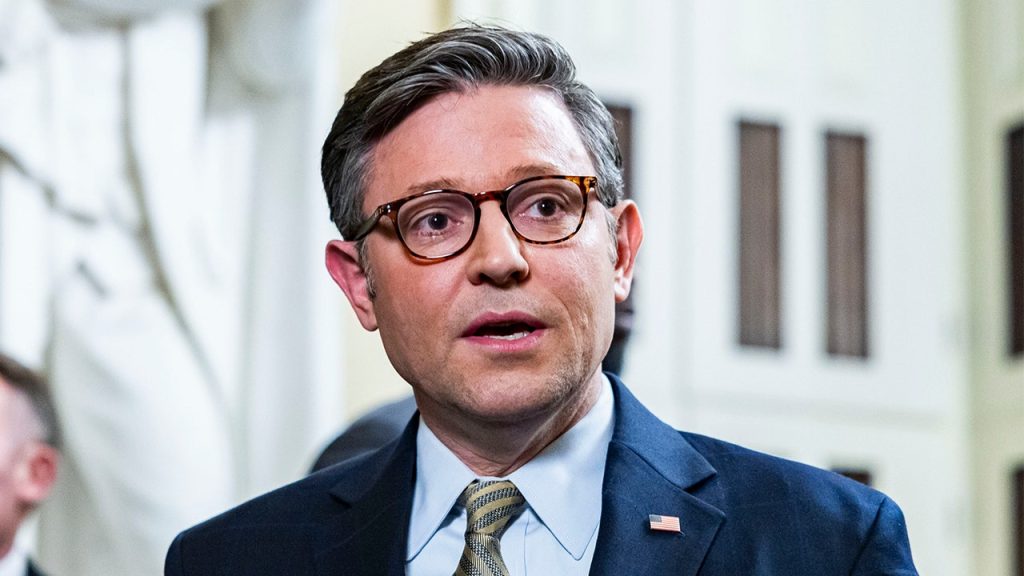The House of Representatives is poised to elect its Speaker, a pivotal leadership role that will shape the chamber’s trajectory for the next two years under the incoming Republican administration. This election comes on the heels of a tumultuous period for House leadership, marked by internal divisions within the GOP. The previous speaker, Kevin McCarthy, was ousted by his own party in October 2023, highlighting the deep fissures within Republican ranks. After a protracted process, Rep. Mike Johnson of Louisiana was eventually elected to replace McCarthy. Now, Johnson seeks to retain his speakership, but the path forward is far from assured. The upcoming vote carries significant weight, not only for the House’s internal dynamics but also for the broader political landscape. Crucially, the House must elect a Speaker before it can certify the presidential election results for President-elect Donald Trump, a constitutional requirement scheduled just days after the speaker vote.
The vote for Speaker is slated for noon on Friday, January 3, 2025, as mandated by the Constitution. This constitutional obligation underscores the urgency of the situation. Until a Speaker is elected, the 119th Congress cannot be sworn in, and consequently, no official business, including the certification of the presidential election, can proceed. This creates a tight timeline and intensifies the pressure on House members to reach a consensus. The recent history of speaker elections suggests that this process could be fraught with challenges. The previous election saw a record 15 ballots before a Speaker was finally chosen, revealing the deep divisions and lack of consensus within the Republican Party. This precedent looms large over the upcoming vote, raising concerns about potential delays and political maneuvering.
Rep. Mike Johnson, the incumbent Speaker, is seeking re-election, but his support within the Republican caucus is not unanimous. While no other candidates have formally announced their intentions, the possibility of alternative contenders emerging on the day of the vote remains open. This uncertainty further complicates the situation and adds another layer of complexity to the already tense atmosphere. The Republican Party holds a slim majority in the House, with 219 seats compared to the Democrats’ 215. This narrow margin leaves little room for dissent within the GOP ranks. Furthermore, the Republican majority is expected to decrease further when two of its members assume cabinet positions in the Trump administration, pending Senate confirmation. This will further tighten the numerical advantage and heighten the importance of every Republican vote. To secure the speakership, a candidate needs an outright majority of the votes cast. Assuming all 434 members vote, a Republican candidate would require 218 votes to win.
The lack of unanimous support for Johnson within his own party presents a significant hurdle. At least one Republican lawmaker, Rep. Thomas Massie of Kentucky, has publicly stated his intention not to vote for Johnson. Other Republicans, such as Rep. Scott Perry of Pennsylvania, have expressed reservations and indicated a willingness to consider other options. This lack of firm commitment from within the GOP ranks underscores the challenges Johnson faces in securing the necessary votes for re-election. Furthermore, House Minority Leader Hakeem Jeffries has stated that Democrats will not intervene to support Johnson if he fails to garner sufficient Republican votes. This stance further isolates Johnson and increases the pressure on him to consolidate support within his own party.
Adding to the complexities surrounding the speaker vote is the recent contentious debate over government funding. Johnson spearheaded several government funding proposals, but these efforts encountered significant resistance from within his own party, as well as from prominent figures outside of Congress. The first proposal failed before even reaching the House floor, while the second was rejected by a bipartisan coalition. Although a third package eventually passed with unanimous Democrat support, over 30 Republicans voted against it. This internal discord over government funding could spill over into the speaker election, further undermining Johnson’s support and potentially emboldening opposition within the GOP. The divisions exposed during the funding debate highlight the fragility of Johnson’s position and underscore the potential for further challenges in the speaker race.
The timing of the speaker vote is particularly sensitive, occurring just days before the scheduled certification of the presidential election results. This proximity adds a layer of political significance to the proceedings, as any delay in electing a speaker could potentially impact the certification process. The House cannot conduct any official business, including certifying the election, until a speaker is chosen and the new Congress is sworn in. This creates a high-stakes scenario with potential implications for the peaceful transfer of power. President-elect Trump has endorsed Johnson for Speaker, a move that could significantly influence the outcome of the vote. Trump’s endorsement carries considerable weight within the Republican Party, and his backing could help solidify support for Johnson among wavering members. However, given the existing divisions within the GOP, even Trump’s endorsement may not be enough to guarantee Johnson’s victory. The upcoming speaker election promises to be a closely watched event, with potential ramifications for both the House of Representatives and the broader political landscape. The outcome will significantly shape the legislative agenda for the next two years and could have lasting consequences for the Republican Party and the country as a whole.

